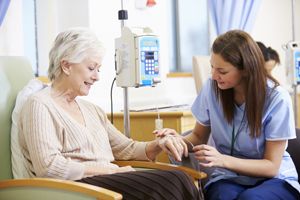New Integrative Oncology Guidelines Provide Patients More Control Over Their Care
Lynda Balneaves, RN, PhD, provides insights into the new SIO/ASCO guidelines that support mindfulness-based interventions for patients with cancer.
Lynda Balneaves, RN, PhD

Integrative therapies, including mindfulness-based therapies, help patients with cancer feel that they have some control over their treatment journey, according to Lynda Balneaves, RN, PhD.
“It can give a sense of empowerment to people,” she said in an interview with Oncology Nursing News.
Balneaves, who is the associate dean and professor at the College of Nursing at the University of Manitoba, as well as the former president of the Society for Integrative Oncology, recently was part of the joint SIO/ASCO expert panel that published recommendations for clinicians to integrative mindfulness-based interventions into routine cancer care. The recommendation applies to patients at any stage in their cancer journey and is supported by an evidentiary body of 80 randomized controlled trials and 30 systematic reviews.
In an interview with Oncology Nursing News, Balneaves unpacked the significance of these guidelines, busting some misconceptions that individuals may hold around integrative therapies and explaining how they can fit into an individual’s overall treatment plan.
Oncology Nursing News: What is the importance of these guidelines? How will they change standard practice?
Balneaves: It is the first time that we have collaborated with ASCO on guidelines that are specific to the management of anxiety and depression experienced by adults living with cancer. We are focused on the potential role of integrative therapies. Those are therapies such as complementary medicine that are used alongside conventional cancer care.
Anxiety and depression are something that we know many individuals living with cancer, as well as their family members, can experience during the cancer journey. It is really dependent on where an individual is receiving care, and the amount of services that are available—including psychosocial oncology services. Funding for those programs, people's insurance, and where they live in the world can really determine whether they receive any type of psychosocial oncology care to manage their anxiety and depression.
Unfortunately, many primary care providers do not get a lot of education or training around oncology. They may not have a lot of training around the potential role of integrative therapies in managing anxiety and depression. As a consequence, a lot of people get lost in the shuffle. They just figure that “feeling down” about their diagnosis and their treatments, feeling overwhelmed by it, is just part of the process. I know that, as an oncology nurse, sometimes the focus in our care is really around treating the cancer and trying to prolong people's lives to ensure that they have a future. We sometimes lose track of those psychosocial and mental health issues that can come alongside cancer. We felt it was really imperative that these guidelines be developed to give direction not only to individuals living with cancer, but also their health care providers.
What integrative therapies are recommended for managing symptoms of anxiety or depression?
I do not think it was surprising to any of us that have been in this field for a long time that the strongest evidence was around the mindfulness-based interventions. They are the ones that have been the focus of the most clinical trials, and we now see systematic reviews, meta-analyses, and guidelines being developed around them.
Mindfulness interventions were shown to be the most effective in managing both anxiety and depression. Mindfulness-based stress reduction, or MBSR, is where people work in a group over several weeks. They talk about some of the issues that people can experience around stress, around coping, around staying in the moment, being non-judgmental about the experiences they're having. They will engage in a daily mindfulness practice. They will engage in some breath work and some gentle movements—usually based on hatha yoga. We also found yoga had strong evidence in terms of managing anxiety and depression during and after cancer treatment. This is primarily hatha yoga, which is one of the gentler forms of yoga.
During cancer treatment, if people are experiencing anxiety and depression, things like relaxation and imagery, hypnosis music therapy, reflexology, and aromatherapy using lavender oil, [can be] helpful in managing their anxiety. Music therapy, in particular, was helpful in managing depression. If we look posttreatment, the main therapies that were found to be effective [in] helping with anxiety were reflexology and acupuncture. Then, if you are looking at depression, tai chi and qigong, which are movement therapies, were found to be effective as well.
Could you explain how the review was conducted and what it means for a recommendation to be given a designation of strong, moderate, or weak?
We created a panel that was in collaboration with SIO and ASCO. It was not just a multidisciplinary team of researchers and clinicians; we wanted to ensure that we had patient advocates, which has been a strong focus of SIO. Once we had that panel formed, we began doing a systematic review of the literature looking from 1990 to 2023. We did an update just before we published the guidelines to make sure it was as current as possible. We focused on the highest-quality studies and literature: randomized clinical trials, meta-analyses, and systematic reviews. We did not use any phase 1 or cohort studies; it was really [centered] on the highest quality [data]. We ended up with over 400 trials, which were reviewed by our team to look at the quality of each of the studies and whether they met our stringent inclusion criteria. Those that were eligible were then [further] reviewed by various groups on the kind of panel that were assigned to look at different aspects, different therapies.
We use something called GLIDES, which is the Guidelines Into Decision Support methodology. It was created by Yale University, and it was founded by the Agency for Health Research Quality. The quality was assessed using the risk-of-bias tool, which helps us see if there is bias embedded in a study. We used the AMSTAR 2 tool which is specifically for meta-analyses and systematic reviews.
"Strong" means we have high confidence in a therapy as part of best practice. You need to have strong evidence for it to get a strong recommendation. There has to be consistent results across studies, minor or no concerns about the study quality, and agreement among the panelists. For "moderate," the evidence is not as strong, but it is still good quality. There are consistent results, but there might be a few exceptions. There might be some minor concerns around study quality. Lastly, in terms of the "weak recommendations," there is limited evidence around benefits vs harms, but the results have been consistent.
What are some of the challenges in designing a randomized clinical trial that evaluates an integrative therapy?
When we are looking at integrative therapies, one of the issues is masking. [For example,] it is hard to mask someone to receiving massage therapy. With acupuncture, we have collapsible needles, but if you have had acupuncture before, and you don't experience that Chi, or the muscle grab, you know that it is a fake needle.
With many of these therapies, you know whether you're engaging in them or not. With the bias risk tool, not being able to mask people to the intervention to placebo is a concern, and many of our trials, unfortunately, do not fare very well using that tool.
Would you recommend interventions that were given a moderate or weak rating to your patients?
I want to point out that for many of these therapies, especially mind-body therapies, physical-touch therapies, and some of the movement therapies, there is low risk attached to them. They are not as invasive as taking a medication or a natural health product.
The evidence, even if it was not the highest-quality, still indicated that there were more benefits than there were harms. Often the ranking was really based on the limitations and the methodological issues that are inherent in doing research around integrative therapies.
Living with anxiety and depression can be debilitating. It can negatively impact people's quality of life and these therapies may offer some relief. While some of these therapies may not have as strong as evidence because of the state of the research at this time, there still is a sense that these could be used alongside other more evidence-based therapies like cognitive-behavioral therapy. They could be an addition with very limited associated harm.
Are there any limitations of this research that clinicians should consider when looking at the guidelines?
We have a lot of research on these therapies in women living with breast cancer, but we do not have a lot on other types of cancer. It is important that a clinician looks at the recommendations of these therapies, where the trials were conducted, and then look at the population or the patient that is sitting in front of them to really determine if the evidence applies in this situation.
Have you ever had a patient who sought advice from an integrative specialist that went against the medical advice that her oncology team had offered?
I remember a woman with advanced ovarian cancer that called me on a Friday at 4pm. I was about to leave the office and she said, “I was told to talk to you. I'm going to an iridologist, [which is someone that looks at your irises in your eye and determines what type of health care you need]. She is telling me to stop all my medications, including my pain medication, so that her therapies will work. Should I do that?”
You could just tell she was just bubbling with anxiety and fear. Here was this woman that has very advanced cancer that was about to remove herself from pain medication at the start of a weekend.
It is so imperative that all oncology health professionals can have a respectful, non-judgmental conversation with these individuals that draws on the evidence to really guide them towards evidence based safe and effective therapies. If I just said to her, “Oh, that person is not a reliable source of information. Don’t listen to her. She’s completely wrong. Don't do it.” She may not have listened to me. By being able to say, “Would you like me to share what I know about the therapies that she's recommending? What evidence we know, what is the potential for harm, you know, to inform your decision?” she [then] had that openness to listen to me.
At the end, she decided, “You know what, this is probably not a great idea to stop my medication, and I should go and talk to my oncologist further about my treatment plan.” So, again, being able to talk without sounding judgmental is so key to engage people in decisions that are going to be safe and informed.
Are there any misconceptions around integrative therapies?
Often, there's a real misunderstanding around these therapies. People think, ‘oh, it's not going to cure your cancer.’ [But] there are a lot of people that are using it to address things like anxiety and depression. They are using it to kind of augment the mainstream cancer therapies that they are using. It allows them to have a sense that they are doing something.
I had one woman say, “I feel like I am on an escalator that I cannot get off of, and being able to go into my yoga class gives me a chance to unwind and feel like I have some control over this very uncontrollable disease and treatment process that I am a part of.”
I have had a lot of people say, “I don’t want to take another pill.”
“I am taking so many different medications that when the doctors say we are going to throw you on Ativan for your anxiety, we are going to throw you on some antidepressants,” they [say], “I really do not want to take any more medication. I'm already experiencing a lot of side effects.”
The wonder about these therapies is that you are not ingesting something. You are engaging in something that gives you that mindfulness and gives you a chance to remove yourselves from the fear and the anxiety that you're experiencing.
A pill is not always the answer, even though it can often be an easy one for busy clinicians.




